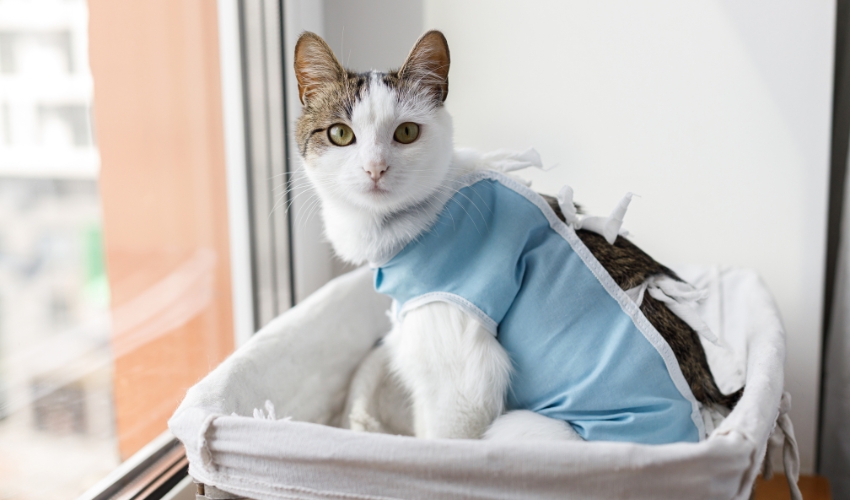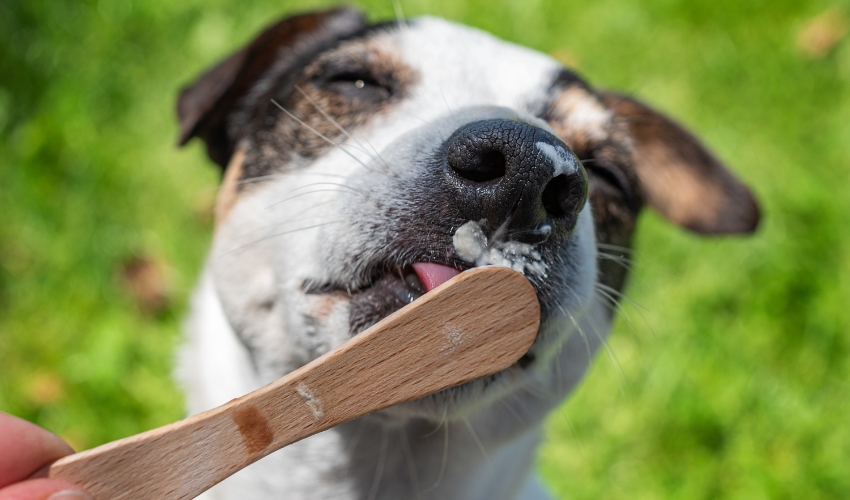Some dogs love the taste and smell of cinnamon. Pet owners might find their furry friends sniffing the spice rack or begging for a cinnamon roll from time to time.
However, is feeding your dogs cinnamon safe? Can dogs eat cinnamon in people’s food or baked into treats? Can they inhale it in powder form or lick it as an essential oil? Keep reading to find out.
Is Cinnamon Safe for Pet Dogs?
As a rule of thumb, only give cinnamon to dogs in small amounts. It’s also best to share this as a rare treat rather than a regular part of the dog’s diet.
For example, some baked treats have a tinge of cinnamon that our pets enjoy. Another option is plain oatmeal with a pinch of cinnamon.
However, regular food like cinnamon rolls and applesauce aren’t safe for pet dogs due to their high sugar content. Moreover, these items may have raisins, nutmeg, and xylitol, which are highly unsafe for our fur babies.
Most veterinarians don’t recommend cinnamon essential oils and sticks, either. It’s best to keep these items away from pet dogs. They may cause several complications when ingested.
Does Cinnamon Have Health Benefits for Dogs?
Commonly, markets offer two types of cinnamon: Ceylon and Cassia. The latter comes from a tree that grows in Sri Lanka. It’s also cheaper, rougher, and thicker than Ceylon cinnamon.
For dogs, the better choice is Ceylon cinnamon since it has lower levels of coumarin. It is a compound that negatively affects kidneys and livers.
In appropriate amounts, cinnamon possesses several benefits for pet dogs:
- This spice can help with a dog’s heart health. One study proved these claims by discovering that dogs who ingested appropriate amounts of cinnamon had lower heart rates and blood pressure than dogs who didn’t.
- Cinnamon also presents anti-inflammatory benefits, which can help elderly dogs who struggle with joint pain and swelling.
- The spice also contains antioxidants and antibacterial properties that can help improve a dog’s overall health.
Remember, though, that it’s best to consult a veterinarian before including cinnamon in your dog’s treats or diet.
What Are the Risks of Feeding Pet Dogs Cinnamon?
While there are many pros to feeding dogs cinnamon, the spice may also present some downsides. These risks may occur when dogs suddenly ingest too much cinnamon.
Mouth Irritation
There’s a reason why veterinarians advise pet owners to infuse treats with cinnamon instead of letting dogs eat them raw. Cinnamon alone may make the pet dog’s mouth, gums, tongue, and other tissues red, swollen, and irritated.
The spice may also trigger an allergic reaction that presents itself, like the symptoms mentioned above. Cinnamon may also cause mouth ulcers in more significant amounts, especially if the pet dog frequently ingests the spice.
It’s also important to remember that cinnamon sticks and essential oils pose more significant risks to a pet dog’s mouth health. It is why many pet owners and animal healthcare professionals recommend keeping oils and sticks away from the reach of pets.
Respiratory Problems
High concentrations of cinnamon can lead to respiratory problems in a pet dog. If it inhales cinnamon powder, chews on a cinnamon stick, or licks a cinnamon essential oil, the dog may experience the following symptoms:
- Coughing
- Difficulty breathing
- Bronchospasms
- Choking
- Shortness of breath
Large amounts of cinnamon powder can also irritate a dog’s lungs, leading to the symptoms mentioned above.
According to experts, one teaspoon of ground cinnamon may threaten a dog’s respiratory health. Essential oils, on the other hand, only require small amounts to irritate a dog’s airways and mouth.
It’s a great idea to sprinkle a pinch of cinnamon or mix it in the dog’s food instead of giving a large amount of raw cinnamon.
Digestive Problems
If a dog swallows a cinnamon stick, it may lead to digestive problems. First of all, the cinnamon stick can block the gastrointestinal (GI) tract.
The spice, whether in oil, powder, and stick form, may also lead to an upset stomach or any of the following symptoms:
- Dog Vomiting
- Dog Diarrhea
Dogs sometimes vomit or have increased bowel movements in response to toxin ingestion, food allergies or sensitivities, or gut obstructions. Smaller dog breeds often feel the effects of large doses more, so be careful when handling cinnamon essential oil, ground powder, and sticks with your precious fur babies.
Other Risks
Large doses of cinnamon also pose the following threats to a dog’s health:
- Hypoglycemia
- Liver Damage or Disease
- Changes in Heart Rate
Some studies found that cinnamon lowers blood sugar levels. The dog may experience hypoglycemia or a concerning drop in blood sugar if taken in large doses.
The spice is also known for lowering heart rate and blood pressure, so a dog may experience sudden changes in heart rate when it excessively eats cinnamon.
Too much cinnamon may also affect your pet dog’s circulatory system functions. As mentioned earlier, it has a compound that may affect kidneys and livers. The coumarin in Cassia cinnamon may present risks to a dog’s liver if not handled well.
What to Do If a Pet Dog Ingests Too Much Cinnamon?

Luckily, consuming large doses of cinnamon isn’t fatal for dogs, but it does warrant a trip to the veterinarian. If the pet dog shows any of the symptoms mentioned earlier, it’s ideal to consult a professional. Usually, they run tests to check the dog’s condition.
Veterinarians can administer medication with pain and vomiting suppressants to protect the stomach and liver. For severe cases, professionals might utilize IV fluids or feeding tubes.
Conclusion
While feeding your dogs cinnamon presents many pros, it’s always best to consult a veterinarian and use the spice in moderation. Pet owners must exercise care when dealing with the well-being of their precious pets.
Knowledge like this comes hand-in-hand with caring for our fur babies. If you want to know more about dog health, make sure to visit the Doobert website and scroll through our content there.
We are also looking for volunteers and aspiring fur parents, so don’t hesitate to contact us if you want to brighten up someone’s day by making them a part of your growing family!











